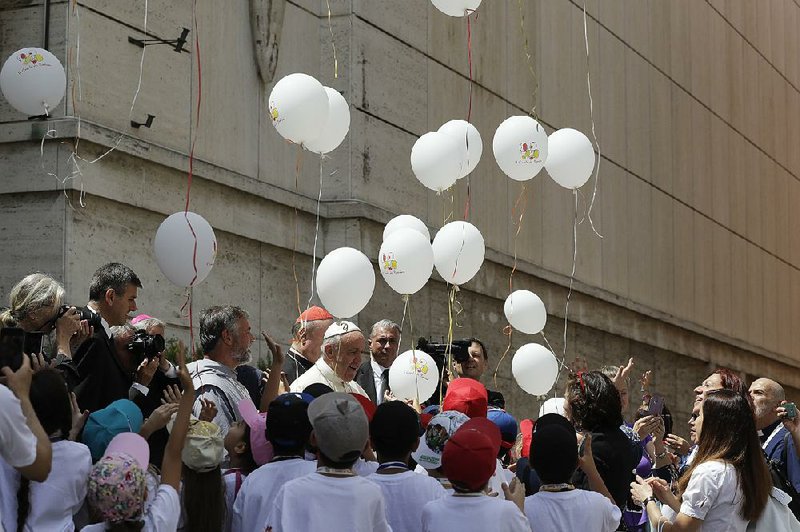ROME -- Three years ago, Pope Francis issued a sweeping letter that highlighted the global crisis posed by climate change and called for swift action to save the environment and the planet.
On Saturday, the pope gathered money managers and titans of the world's biggest oil companies during a private conference at the Vatican and asked them if they had gotten the message.
Pressure has been building on oil and gas companies to transition to less polluting forms of energy, with the threat of fossil-fuel divestment sometimes used as a stick.
"There is no time to lose," Francis told them Saturday.
While Francis lauded the oil executives for embedding an assessment of climate-change risks into their planning strategies, he also put them on notice for their "continued search for fossil fuel reserves," 2½ years after the Paris climate accord "clearly urged keeping most fossil fuels underground."
"Civilization requires energy, but energy must not destroy civilization," he implored.
"Will we turn the corner in time? No one can answer that with certainty," the pope said. "But with each month that passes, the challenge of energy transition becomes more pressing."
He called on the participants "to be the core of a group of leaders who envision the global energy transition in a way that will take into account all the peoples of the earth, as well as future generations and all species and ecosystems."
In an era when the White House is viewed by many scientists as hostile to the very idea of climate change, with President Donald Trump announcing the United States' withdrawal from the Paris climate accord, Francis is seen as an influential voice to nudge oil executives to take action on the issue.
Among those summoned to a 16th-century villa in the Vatican gardens were the chairman of Exxon Mobil, the chief executive of Italian energy giant Eni and the chief executive of BP.
Japanese, American, British, French and Norwegian money managers were also on the list, according to news accounts, as well as the chief executive of the investment firm BlackRock and a former energy secretary under President Barack Obama.
Energy experts and those who advocate fighting climate change expressed doubts before the conference that it would amount to anything other than a PR opportunity for the companies to burnish their image without making meaningful changes.
In his remarks, the pope said he hoped the meeting gave participants the chance to "re-examine old assumptions and gain new perspectives."
Francis said that modern society with its "massive movement of information, persons and things requires an immense supply of energy." And still, he said, as many as 1 billion people still lack electricity.
Cardinal Peter Turkson, one of the architects of "Laudato Si," as the pope's encyclical is known, opened the conference Friday at Casino Pio IV, a villa that houses the Pontifical Academy of Sciences.
On Saturday, the pope reiterated his call for a transition from fossil fuels "to a greater use of energy sources that are highly efficient while producing low levels of pollution." It was a challenge, he acknowledged, "of epochal proportions," but also one that presented an "immense opportunity" to "promote the sustainable development of renewable forms of energy."
He said that though the world is affected by climate change, it was the poor who would "suffer most from the ravages of global warming." Francis added that the transition "is a duty that we owe towards millions of our brothers and sisters around the world, poorer countries and generations yet to come."
Last month, a group of investors representing more than $10.4 trillion in assets published a letter in The Financial Times urging the oil and gas industry to "be more transparent and take responsibility for its emissions," which account for 50 percent of global carbon emissions, according to the Carbon Disclosure Project, an organization based in London.
To date, according to the Global Catholic Climate Movement, dozens of Catholic institutions have divested from fossil fuels, including Caritas Internationalis, a confederation of relief organizations; Catholic banks with more than $8.3 billion on their balance sheets; archdioceses; religious orders; and lay movements.
The pope on Saturday said that the situation was dire. Despite the Paris agreement, carbon dioxide emissions and atmospheric concentrations of greenhouse gases remained high. He said the search for new fossil fuel reserves was "even more worrying."
"We received the earth as a garden-home from the Creator," Francis said. "Let us not pass it on to future generations as a wilderness."
Information for this article was contributed by Elisabetta Povoledo of The New York Times; and by staff members of The Associated Press.
A Section on 06/10/2018

